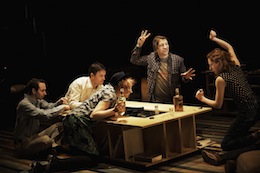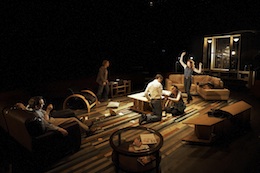Declan Hughes was right. It may not be a playwright’s duty to predict the course of a country via his own writing, but it doesn’t hurt a play’s vitality. When Rough Magic first produced Digging for Fire in the Project Arts Centre in 1991, audiences were given a glimpse of a convulsive new Ireland via seven restless thirtysomethings. In this new production, it is almost as if the text manages to physically bridge the time between a foggy past and our bleak present.
Digging For Fire takes its name from a Pixies song from their 1990 album ‘Bossanova’, which plays moments before Clare (Orla Fitzgerald) emerges on stage, wearing a Siouxsie and the Banshees t-shirt, swilling Stoli. Clare spends most of the first scene digging through her books and memory in order to remember the B side of the Sex Pistols ‘Pretty Vacant’ single as her husband Brendan (Will Irvine) dutifully lifts the dust from their record collection and various surfaces in their apartment in advance of an imminent dinner party. It is a fitting set-up for Clare, who is herself desperately trying to rediscover a lost self as the walls of her comfortable life enclose upon her.

There is something instantly familiar about the story Declan Hughes hatches here: seven friends reunited for one night ten years after college thanks to the return of émigré writer Danny (John Cronin) from New York. It almost feels like a plot from John Hughes film from an earlier decade, one of those movies painfully of its time where the characters test the limit of their friendship before lovingly making peace and committing to the future. And though American and English pop culture loom large in the imaginations in these characters, on this evening in question, they are bound on a uniquely Irish course towards drunken catharsis and hungover disintegration.
Time finds the group divided, but achieving things. Danny, who’s just published a story in the New Yorker, and Emily (Margaret McAuliffe), a painter who's just had successful exhibition, are both back from New York and suffering varying degrees of cultural dislocation. Breda (Jody O'Neill), producer on a Gerry Ryan-esque morning chat show on RTÉ, is dating Steve (Raymond Scannell), a horndog who works in advertising. Rory (Paul Mallon), a gay lawyer, stands on the margins of them all, reminding them how bad an idea this all is. Meanwhile Clare, who teaches, struggles with the burden of normality that her and Brendan, a doctor, have built for themselves.
 Though the text features plenty of time-specific content – jokes about feminism, discussions of AIDS – director Matt Torney brings little nostalgia for the early ‘90s. We move quickly from Clare and Brendan’s apartment to the pub and back again amid a growing clamour of chaos. The Project’s theatre space is quite innovatively reimagined by Torney and set designer Ciarán Bagnall in traverse, with the seats arranged along both side walls. The result is an unexpected intimacy in the company of these characters, and thanks to Bagnall’s lighting, an ability to see across at the other half of the audience. Torney gives the audience a finer awareness that this production, and this historical moment, is something we experienced collectively.
Though the text features plenty of time-specific content – jokes about feminism, discussions of AIDS – director Matt Torney brings little nostalgia for the early ‘90s. We move quickly from Clare and Brendan’s apartment to the pub and back again amid a growing clamour of chaos. The Project’s theatre space is quite innovatively reimagined by Torney and set designer Ciarán Bagnall in traverse, with the seats arranged along both side walls. The result is an unexpected intimacy in the company of these characters, and thanks to Bagnall’s lighting, an ability to see across at the other half of the audience. Torney gives the audience a finer awareness that this production, and this historical moment, is something we experienced collectively.
The rock of this memorable production is Fitzgerald, in whose hands Clare emerges as an iconic character of recent Irish theatre. Drink and lost love have roused her from a long slumber and as she desperately tries to claw back some purer version of herself through a fugue of inebriation, it is clear that Clare is paralysed not just by a man or a relationship, but by a nation. Fitzgerald brings much yearning and rage to the role. The cast function wonderfully as an ensemble, with Cronin bringing plenty of righteous anger to his role as Danny, the emigrant success-story and fraud; O'Neill is defiant as the voice of this new Ireland and Scannell particularly hilarious as the south Dublin ad man incredibly fond of the adjective ‘mondo’.
.jpg.aspx%3Fwidth=260&height=173) Yet it is the disarming coincidences between the time that this play is set and present day Ireland that give this production a very troubling resonance. (Clare herself is able to locate the exact moment when she surrendered: the 1987 general election, where Labour was punished for misleading voters and Fianna Fáil were elected with vaguely socialist promises that were all proven to be garbage.) The orgy of unfettered capitalism that sunk the country was not some virus collectively caught, but rather a gradual, but profound, cultural transition and Hughes puts us quite close to its origin here. In the original production, the characters of Breda and Steve, both vain and vaguely vulgar, could have been seen as comic foils, but they now feel like the torchbearers for a country ready to reimagine itself in its own free-market image.
Yet it is the disarming coincidences between the time that this play is set and present day Ireland that give this production a very troubling resonance. (Clare herself is able to locate the exact moment when she surrendered: the 1987 general election, where Labour was punished for misleading voters and Fianna Fáil were elected with vaguely socialist promises that were all proven to be garbage.) The orgy of unfettered capitalism that sunk the country was not some virus collectively caught, but rather a gradual, but profound, cultural transition and Hughes puts us quite close to its origin here. In the original production, the characters of Breda and Steve, both vain and vaguely vulgar, could have been seen as comic foils, but they now feel like the torchbearers for a country ready to reimagine itself in its own free-market image.
By the play’s end, the party, and the friendships, break down purely on political lines: Brendan, Breda and Steve all walk out together. (Rory, who keeps an enforced distance from the nostalgia of friendship, leaves the house first and alone.) The arty romantics, who in Breda’s words are now shorn of their “old socialist shibboleths” are left to “keep the faith”, even if Hughes allows Clare a defiant, if nostalgic, dance to New Order’s ‘True Faith’ at the conclusion.
The premise for Digging For Fire may be a reunion of seven old friends, but in fact, it is a debate – and at one point a fight – over which direction Ireland will take. It is a play of a more political time, but with its characters confused by pop culture, burdened by information, and of course, communicating via the prodigious consumption of alcohol, this inspired production of Digging for Fire feels more like a step into a bizarre time continuum than a journey into Ireland’s recent past.
Donald Mahoney